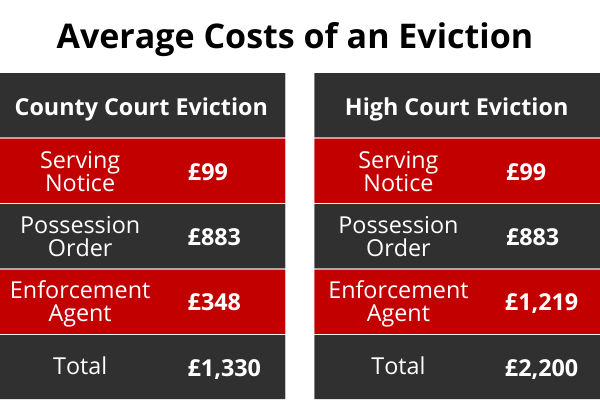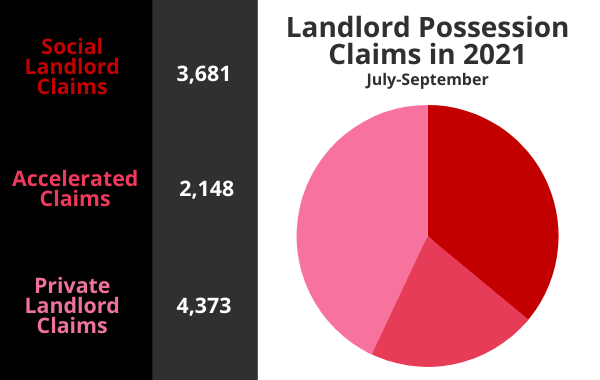Evicting tenants through the official legal procedure inevitably takes some money and research. If your tenant does not defend against your section 8 or 21, you may be able to settle matters out of court.
Regretfully, for many landlords, court time and fees are necessary. But what are those court costs likely to amount to? And who is responsible for paying the legal fees for evictions?
How much do landlords pay to evict a tenant?
This can vary considerably, depending on the circumstances. As a guideline, court processes for evictions often cost between £1,300 and £2200. If the eviction is heavily contested, it may be higher. If the tenant consents to leave after a Section 21 notice without going to court, the legal fees will be much less.
There are also additional costs at other stages of the process. Standard possession orders cost £355, there may be other admin fees, and it may be necessary to hire a bailiff if your tenants do not leave your property.
If you’re considering whether the costs for an eviction will be more with a country court or high court eviction, you can get an idea of the likely fees below.
Can I claim court costs from my tenant?
Who pays the court costs for an eviction in the UK? If the judge awards a possession order with costs, you can recover some of your court expenses from your tenant. You may also be able to recover some court costs if this is included in your tenancy contract. However, in most cases, the money awarded will be fixed costs rather than the actual expense of the legal proceedings.
When fixed costs are given, they often cover a court fee of £325-£355, a judgement cost of approximately £57 and costs on commencement depending on how the claim form is served, the number of defendants, and whether judgement is sought concerning rent arrears. The court may choose to alter the fixed cost if the defendant has shown unreasonable conduct which added to the claimant’s costs.
Up until 2017, the court could not limit the amount a landlord could request from their tenant to pay as an “administration cost”. However, in recent years, they have gained the power to reduce or extinguish the amount.
If you eventually settle the matter with your tenant out of court, you could alternatively negotiate the payment of the actual legal fees as part of that settlement.
What help with legal costs can I apply for?
If you have legal expenses insurance, this may cover or partially cover your court fees. Another route is to establish whether you qualify for help from the government. In England and Wales, you may qualify if:
- Your fee is between £1,000 and £10,000 and you have less than £16,000 in savings
- You’re over 61 have less than £16,000 in savings
- You’re on benefits or are low-income
If you successfully meet the criteria, you might be able to get a reduction on your court, tribunal fees, or other costs for an eviction.
What is the procedure for evicting residential tenants?
For a more in-depth version of the process, read our free ebook – The Landlord’s Guide to Tenant Evictions.
There are two primary routes for tenant evictions concerning an Assured Shorthold Tenancy: serving a Section 21 notice or a Section 8 notice.
Section 21 Notices
Section 21 notices are often considered to be more straightforward as eviction notices. However, these eviction notices can only be issued under particular circumstances. Unlike Section 8 notices, they don’t indicate a specific reason why the eviction should take place. Their role is more to serve as a notification that you wish to recover your property at the end of the tenancy agreement.
Section 21 Notices cannot be issued within the first 4 months of a tenancy, must give your tenants at least 2 months advance notice. They only remain valid for 6 months. There are several other regulations for when it is possible to serve a Section 21 notice, and these can vary across England and Wales.
After receiving the notice, it’s hoped that the tenant will make plans to move to alternative accommodation before the end of the notice period. If this does not happen, you will need to go to court for a possession order and a warrant for eviction. You may apply for an accelerated possession order if you’re not claiming rent arrears.
It is possible that the notice could be made invalid if the tenant takes a concern about the condition of the property to the local housing authority. If you have not adhered to one of the rules concerning Section 21 notices, the tenant could also choose to challenge the notice.
Section 8 Notices
Section 8 notices are often used when there is a specific problem in the tenancy. For example, they may have rent arrears, be using the property for illegal purposes, or have otherwise broken the terms of the tenancy agreement.
Serving a Section 8 notice does not guarantee that your tenant will be successfully evicted. A court process is required where the judge will consider the reasons for eviction and your tenant’s defence (if any). If the tenant owes you rent, you can seek to recover it as part of the same claim.
After this, the court may choose to allow the tenant to remain in the property, although this may come with certain conditions – such as that they pay back any arrears in regular instalments.
What if the tenant fails to leave by the date on the possession order?
If the judge grants you a possession order, your tenant should leave by the agreed date. If they fail to do this, you can ask for county enforcement officers to be sent with a notice of eviction. This eviction process will give the occupiers at least 14 days notice to vacate the premises.
Alternatively, you could turn to High Court Enforcement Officers, like Able Investigations. Our team are able to assist you in completing a Writ of Possession and act as High Court Bailiffs to ensure your eviction runs smoothly, legally and ethically.
Why Work with Able Investigations?
Failing to follow the correct procedures when it comes to tenant evictions can mean you end up with a hefty fine or criminal allegations. It’s vital to employ trusted agents with a full knowledge of the law to ensure a safe and legal eviction.
Able Investigations have been working with local authorities, private and commercial, landlords, land agents and many other clients since 1993 and are the leading authority in speciality enforcement. Learn more about our eviction services here.







Comments are closed.